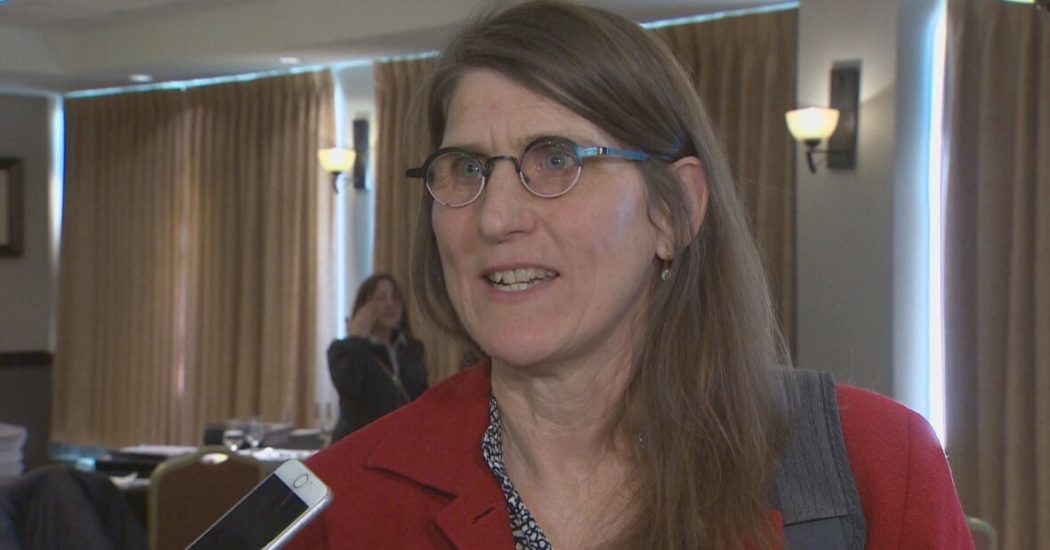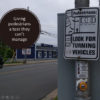
KJIPUKTUK (Halifax) – Just like people who are incarcerated in jails and prisons, the 800 or so people who live with developmental disabilities and are institutionalized in Nova Scotia are at high risk of being exposed to COVID-19.
After all, whether incarcerated or institutionalized, outbreaks are very difficult to control as practicing social distancing in these places is pretty well impossible.
Like jails and prisons, institutions for persons with developmental disabilities are under a lockdown order, meaning no visitors allowed and residents are not permitted to leave the premises.
The news we are hearing about prisons in the States and elsewhere in Canada is extraordinarily grim. In response, quite a few incarcerated persons are being released. In Nova Scotia residents of institutions are not so fortunate.
COVID-19 doesn’t discriminate between nursing homes and institutions
Many of the people who reside in institutions, and their loved ones, likely were not reassured when Dr. Strang addressed these risks at yesterday’s daily briefing.
To put it bluntly, he did a bad job of it.
The question around risks was posed by Tim Bousquet, who writes for and runs the Halifax Examiner. Earlier this week the order under the Health Protection Act, the same order that mandates social distancing, was amended to provide further clarity and rigour on how the Medical Officer of Health wants to manage risks in nursing homes funded by the Department of Health and Wellness.
Why did the amendment not include the institutions funded and licensed by the Department of Community Services, Bousquet wanted to know.
“These types of homes don’t have the same level of nursing care, and many of the directives would not be applicable to those institutions,” Strang said. “They are certainly vulnerable, please don’t get me wrong, but they don’t have the same level of vulnerability as many of our frail elderly. Simply, it’s a different setting than a long term care facility.”
Disregarding for now that many people would quarrel with the term homes for these very institutionalized settings, Strang’s response also ignores the fact that quite a few residents of these institutions are at risk because of their advanced age or medical conditions, no less so than residents of long term care facilities.
Anyways, whether you are incarcerated, live with disabilities or are just old and in need of support, the risks of an coronavirus outbreak are equally terrifying.
Meanwhile, almost all of the new protocols that are now binding in nursing homes, protocols around screening, monitoring, new admissions, testing, notification and so on, are equally applicable to any facility in lockdown, whether its residents are old or not.
Accountability is crucial, says human rights lawyer
Not including the DCS-funded facilities is a serious omission, says Claire McNeil.
McNeil is a human rights lawyer who in a recent Nova Scotia Human Rights Tribunal represented the Disability Rights Coalition, a group of organizations and individuals advocating for community-based solutions such as small option homes, rather than institutionalization.
“This order has the force of a court order, there are consequences and punishments if the order is not followed. The department of Community Services is not taking responsibility in the same way that the department of Health and Wellness is,” says McNeil.
McNeil is especially worried about the plan to isolate people who are diagnosed with COVID-19 within the confines of the institution.
Joyce D’Entremont, chair of Diverse Abilities NS, an association of the large institutions in Nova Scotia, defended the practice when I spoke with her earlier this month.
“We deal with situations like this all the time in the Community Services sector. Influenza is around every year. We have very strict isolation protocols and processes where staff would wear Personal Protective Equipment and would limit you from going in other rooms, etc. We have very well defined processes,” D’Entremont said.
But for McNeil the risk remains a grave concern.
“The model of isolating people who are diagnosed with COVID-19 within the confines of the institution, what we’re hearing from other jurisdictions, such as Italy, is that that’s a mistake. Within an institution the virus spreads so easily that even with best intentions and best effort, there’s a huge risk. You should not keep someone who has the virus in an institutional setting, where as we know, there are shared bedrooms and so forth. Social isolation and physical distancing measures are pretty much impossible there,” says McNeil.
“Especially at a time when you may find yourself short staffed because of people having to self isolate and take time away from the workplace. It’s a perfect storm.”
Another new provision in the Health Protection Act order allows for the admission of new residents during the lockdown.
“The short term or temporary admission should be halted and suspended during this pandemic and provisions should be made for those supports and services to be provided in the community as a public health measure,” says McNeil.
Similarly, the people who are infected should be moved out of the facility, McNeil believes.
Accommodate infected residents in the community
“There are lots of creative solutions. There is lots of empty hotel space and other empty spaces in the community right now as a result of the outbreak that would be available,” says McNeil.
“It’s very sad to say, but it looks like the chickens are coming home to roost. The province hasn’t put a priority on building our community based support services systems, such that right now that creates a huge problem in terms of providing the kinds of support that people who are elderly or who have a disability will require,” McNeil says.
D’Entremont suggests that the institutions within her organization are well positioned to weather the pandemic.
“We are taking many, many measures within our four walls to ensure social distancing with our clients with disabilities. We have increased our cleaning, all high touch surfaces are being cleaned numerous times each day,” D’Entremont says.
“We are screening staff now as they come into the facility. We take their temperature? Do you have flu-like symptoms? Have you traveled outside of the province? Have you been in contact with anybody who has been infected? And we are assuring staff that if we mandate them to quarantine for 14 days, they will be paid, it will not be out of their sick bank,” she says.
McNeil still wants to see accountability and transparency defined the same way Dr. Strang’s order did for the department of Health and Wellness.
“We’re not clear what the mandatory requirements are of those institutions, and how they are enforced. We’re not questioning that people are having the best of intentions to run these organizations and institutions, that they’re doing their very best. We certainly recognize that this is a hugely difficult time for their staff and management. But that’s why we say, all the more reason for Community Services to show some leadership and create the framework that everybody’s looking for,” says McNeil.
With a special thanks to our generous donors who make publication of the Nova Scotia Advocate possible.
Subscribe to the Nova Scotia Advocate weekly digest and never miss an article again. It’s free!




Ms. MacNeil is so correct in identifying the issues of people living in institutions under the management of the Department of Community Services
These living arrangements are filled with vulnerable Nova Scotians who are powerless to speak out or to protect themselves from Covid-19!
Like LTC Facilities and Correctional institutions , DCS institutions will be a breading ground for this killer
Good intentions are not enough
We need to take appropriate measures to protect All of the citizens of NS
I agree….. My son is in there for petty crimes he committed while suffering with a mental illness & he was just denied request for a bail hearing, I presume because he denies he has a mental illness , he is high risk for the virus because he has a lung diseases … if our justice system had taking what I had to say into account, he would have already been sent to the proper facility & gotten the help he needed & been released by now! It’s all bureaucratic BS! …..mean time my sick son is like a sitting duck & his family lives in worry every day!
This article really reads like the person who wrote it is on the OUTSIDE of these institutions. There are a lot of good points brought up, but at the same time a lot of points missed or ignored. I work at the largest nonprofit organisation housing people with disabilities here in NS. To say that residents are arguable not living in homes is wrong. At least in my agency, they live and are cared for in their own HOMES. We are doing the best we can for them, and honestly, suggesting they be quarantined alone in a hotel rather than in their own room in their own home would be, at least for the residents I support, REALLY BAD. A lot of them are already hurting from this, it’s true they’ve been locked down for a month or more now, they can not go to work, they can not have visitors, they can not really go outside … they are already afraid and find it hard to understand what is happening. They would be so much more comfortable quarantined in their own homes with staff that they are familiar and comfortable with than in some hotel. For some of them, yes, they can go to their families to be quarantined. But this article says it itself – some of them are elderly and vulnerable. Some of them have NO living family. So where would they go? They would be even more isolated if they were removed from their homes. We do indeed have protocols in place to keep everyone safe. Our staff work very very hard to keep everyone safe and while this article seems to be written in good faith, it definitely reads as though this author has never worked or lived in one of these homes. Nor did they reach out to the actual people affected to get their perspective or ask what THEY want or need. Our agency DOES consider their wants and needs, however. Some of our residents have gone with their families, some have stayed. We are doing our absolute best for them and we have strict protocols in place to keep everyone safe, that’s all true. It is like any other home, except with support staff who unfortunately must come and go.
I agree that DCS needs to do more in general to support and protect these people. But with regards to this virus, they have been doing a good job. Advocating for removing people from their homes and forcing them into hotels without even considering if that would be an environment they are comfortable in is a big mistake! Sure, the option should be there for residents who would feel safer that way, but I think many of them would choose to stay in their own home and their own room. These people aren’t living in huge institutions with beds stuffed together in rooms or anything like that, they are living in houses and apartments – normal living quarters, leading normal lives. And they should also be consulted when advocating for them. Yes, they have disabilities, but they still have hopes, dreams, wants, and needs, and they are able to express them. “Nothing about us without us”.
** This comment is not speaking on behalf of my agency but is just my opinion from working within it. **
“At least in my agency, they live and are cared for in their own HOMES.” The article is not about people with disabilities who are living in their own homes, it is about those who are living in institutions, which is an entirely different situation. I have physical disabilities and live in my own home and am very grateful I do not live in one of these horrible places. Long before Covid-19, they were disastrous, understaffed, staff overworked, unsanitary, diapers not changed regularly, no regular bathing, people dying of pressure sores, etc.
Dr. Strang: “…they don’t have the same level of vulnerability as many of our frail elderly.” Wow. This guy’s a doctor? How can a doctor be so profoundly ignorant? If you are in such bad shape that you are in an institution, you are in a very poor state of health. Wheelchair users in these homes are almost entirely sedentary, which compromises their immune system and lung strength.
Society, as a whole, is very sentimental about its elderly citizens so we go to great lengths to protect them. However, people with disabilities are largely not valued. It’s a tragedy if grandpa dies but if some useless person in a wheelchair or someone with developmental disabilities who only burdens the system and contributes nothing dies, few care and even fewer notice.